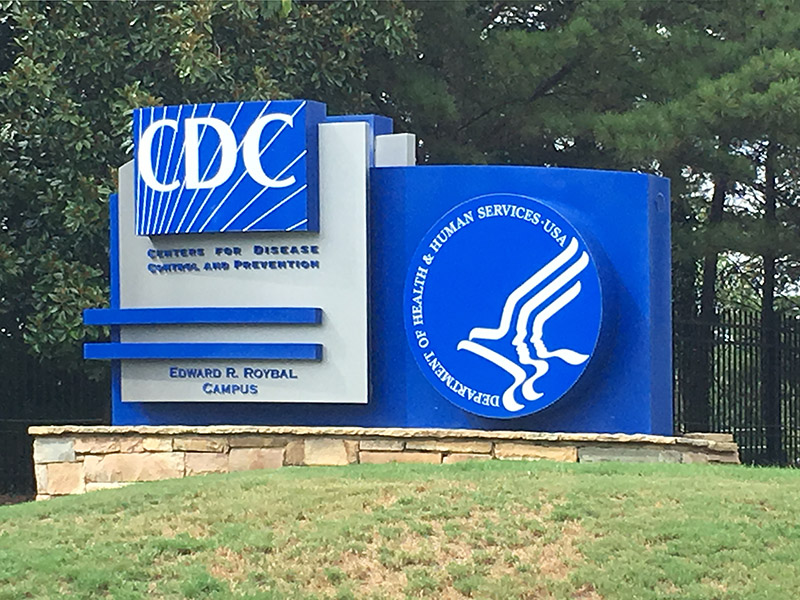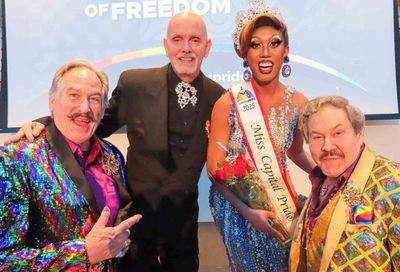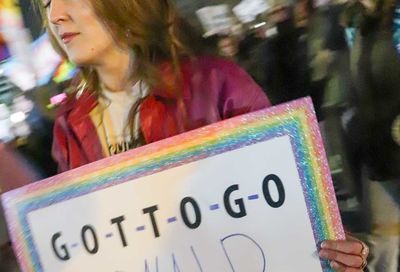HRC attacks Trump’s COVID-19 response in digital ad featuring Trade nightclub
Ad seeks to highlight economic fallout from pandemic as a way to encourage voters to support Joe Biden over Donald Trump
By John Riley on September 22, 2020 @JRileyMW

The Human Rights Campaign recently attacked President Donald Trump, and in particular, his response to the COVID-19 pandemic, as part of a digital ad targeted to members of the LGBTQ community.
The ad, entitled “The Empty Temple,” is part of a seven-figure effort launched by HRC’s Equality Votes PAC, which is targeting pro-equality candidates in swing states and districts.
It features shots of the interior of Washington, D.C.’s Trade nightclub, portraying the bar — and others like it — as casualties of the ongoing COVID-19 pandemic.
“This is a queer bar. It’s barely open,” the narrator of the nearly two-minute ad intones. “Here, you would normally see people being themselves with their community — sometimes for the first time in their week, or for the first time in their lives — and no one knows when we will be free to come back and truly be ourselves.”
The narrator continues, “Make no mistake, this happened because our most powerful politicians made bad choices, and they blame us and they continue to attack our community and make us feel less safe to be ourselves.
“But we aren’t going down without a fight. We’re making our voices heard. Fighting for our lives — and each other’s. Now’s when we need to turn it up.”
HRC’s campaign arm has dedicated its efforts this year to educating LGBTQ voters and their allies about the threat that the Trump administration and its policies, and has been endorsing pro-equality candidates, including Democratic nominee Joe Biden, who they believe will reverse some of those anti-LGBTQ policies.
Altogether, the organization has dedicated $2 million to promoting “get out the vote” campaigns, in addition to ads, direct mail pieces, phone calls, and other outreach efforts leading up to Election Day.
HRC has previously been critical of the Trump administration’s handling of the pandemic, providing research showing that LGBTQ people are more likely to be frontline workers or work in industries that involve large amounts of human contact that potentially put them at risk for transmission.
According to that research, the LGBTQ population is 30% more likely to have lost their job due to pandemic-related closures, and the effect on LGBTQ people of color, who are 44% more likely to have lost their jobs or had their hours reduced, has been particularly devastating.
The ad cites the fact that Black and brown communities have been disproportionately impacted by COVID-19, and that LGTBQ people are dealing with “compounding years of inequality” and struggling to survive financially.
“Bars and restaurants are not open right now, so people are losing their jobs and losing their income,” a woman in the commercial says.
“Immigrant families and families of color are suffering the most due to COVID-19,” says another.
See also: HRC: Economic fallout from COVID-19 has “hit trans community especially hard”
“We have a president who doesn’t care about us,” the original narrator continues. “He’s racist, he’s sexist, he’s homophobic, he’s transphobic. He tries to intimidate us with the threat of violence. His cronies in Washington and state houses across the country have enabled him at every step.”
The ad drops after appeals by Republicans — most notably former Acting Director of National Intelligence Richard Grenell — have attempted to portray Trump as the “most pro-gay president in American history.”
The basis of that contention is that Trump has supported the idea of marriage equality long before becoming president, and was, on the campaign trail, noncommittal on transgender issues.
But critics of the president contend that while Trump might not be opposed to cisgender male couples who conform to gender stereotypes, his record when it comes to the larger LGBTQ community has more negatives than positives, particularly for members of the transgender community.
They point to his administration’s rescission of guidance to schools urging administrators to treat trans children according to their gender identity, the president’s stated support for a ban on transgender military service, and his administration’s various attempts to erase LGBTQ data from the foster care and adoption reporting system, as well as eliminating LGBTQ-specific references from USAID’s gender policy, removing demographic questions pertaining to sexual orientation or gender identity in federal surveys, and refusing to acknowledge the citizenship of children of same-sex couples who are born via surrogacy abroad.

Nonetheless, some advocates are concerned at anecdotal tales of LGBTQ people who are supporting the president or are being convinced that his record is better than Joe Biden’s when it comes to issues of equality — an argument that Grenell has repeatedly tried to advance, citing a quote from Biden from the 1970s in which he said he believed gay U.S. Civil Service employees might pose a security risk — a common sentiment from the 1940s-1990s, when many people believed that a person’s sexual orientation could be used to blackmail them.
Although Biden has since changed his views on LGBTQ rights, many people have used his quote out of context to try and paint him as hostile to the LGBTQ community’s interests, especially among younger left-leaning voters who don’t know much about Biden’s record, get their information from Twitter, or already viewed him with hostility due to their personal support for Sen. Bernie Sanders’ presidential bid.
A recent voluntary survey of Hornet app users who identify as gay, bisexual, trans or queer males sparked much controversy after 45% of self-identified U.S. citizen users said they would vote for Trump, compared to just 51% who said they’d support Biden.
HRC’s commercial is clearly aimed at voters who are less familiar with Biden, and attempts to use the pandemic as an illustration of the government’s disregard for the wellbeing of vulnerable or marginalized groups.
That’s why the ad urges voters to support Biden and his vice presidential pick, California Sen. Kamala Harris, to “make our voices heard in every race in America.”
“Winning the election alone will not solve everything — but losing could cost us everything,” the ad’s chief narrator says. “Together, we can win.”
Read more:
Former Kroger employees claim they were fired for refusing to wear aprons with “rainbow” hearts
Mitch McConnell: President Trump’s SCOTUS nominee “will receive a vote”
Air Force Reverses Ban on Pronouns in Email Signatures
The reversal complies with a 2023 law that prohibits the Secretary of Defense from banning pronoun usage by DoD employees.
By John Riley on April 13, 2025 @JRileyMW
The U.S. Air Force is rescinding a ban on including preferred pronouns in email signatures and other communications. The military branch announced the change in a news release.
The reversal was signed by Acting Assistant Secretary of the Air Force for Manpower and Reserve Affairs Gwendolyn DeFilippi.
The earlier directive, signed by Defense Secretary Pete Hegseth, was issued on January 31 to comply with an executive order issued by President Donald Trump stating that the United States government will only recognize two sexes -- male and female -- as legitimate.
Trump Administration May Close CDC’s HIV Prevention Division
HIV prevention advocates worry about the possible effects of defunding federal HIV prevention programs.
By John Riley on March 22, 2025 @JRileyMW
The Trump administration is considering a plan to eliminate the Centers for Disease Control and Prevention's (CDC) Division of HIV Prevention.
The CDC provides approximately $1 billion per year on domestic HIV prevention, funneling funds to states and territories, who then distribute it to local health departments and organizations.
The money primarily goes toward testing efforts to detect and respond to HIV outbreaks, carrying out campaigns to educate the public about the disease, and to encourage the adoption of prevention methods, including condoms and the use of pre-exposure prophylaxis (PrEP) to reduce chances of transmission.
Germany Warns Transgender Citizens About Travel to U.S.
Germany's Foreign Office is warning transgender and nonbinary travelers that they may face obstacles when trying to enter the United States.
By John Riley on March 6, 2025 @JRileyMW
Germany's Foreign Office is issuing warnings to transgender and nonbinary citizens traveling to the United States.
The warning is due to a recent executive order from President Donald Trump declaring that only passports with male or female gender markers will be accepted as valid. The order erases transgender identity from law, refusing to acknowledge a person's gender identity if it differs from their assigned sex at birth.
Under Trump's order, the U.S. will only recognize two sexes: male and female, based on biological characteristics at birth as a matter of policy. It declares that gender cannot be changed through medical interventions.
Support Metro Weekly’s Journalism
These are challenging times for news organizations. And yet it’s crucial we stay active and provide vital resources and information to both our local readers and the world. So won’t you please take a moment and consider supporting Metro Weekly with a membership? For as little as $5 a month, you can help ensure Metro Weekly magazine and MetroWeekly.com remain free, viable resources as we provide the best, most diverse, culturally-resonant LGBTQ coverage in both the D.C. region and around the world. Memberships come with exclusive perks and discounts, your own personal digital delivery of each week’s magazine (and an archive), access to our Member's Lounge when it launches this fall, and exclusive members-only items like Metro Weekly Membership Mugs and Tote Bags! Check out all our membership levels here and please join us today!
The Magazine
-
Most Popular
 Hugh Bonneville Delivers a Show-Stopping Vanya
Hugh Bonneville Delivers a Show-Stopping Vanya  Gay Army Reserve Officer in Uniform Sex Video Scandal
Gay Army Reserve Officer in Uniform Sex Video Scandal  Transgender Blackhawk Pilot Sues Right-Wing Influencer
Transgender Blackhawk Pilot Sues Right-Wing Influencer  Gay French Thriller 'Misericordia' is Creepy and Suspenseful
Gay French Thriller 'Misericordia' is Creepy and Suspenseful  Air Force Reverses Ban on Pronouns in Email Signatures
Air Force Reverses Ban on Pronouns in Email Signatures  'cullud wattah' is a Compelling Drama About Flint's Toxic Water
'cullud wattah' is a Compelling Drama About Flint's Toxic Water  Awesome Con Gallery: Rage Gear Studios
Awesome Con Gallery: Rage Gear Studios  WorldPride Warns International Trans Visitors About Travel Risks
WorldPride Warns International Trans Visitors About Travel Risks  WATCH: Ad Attacks Senator Over Trans Athlete Vote
WATCH: Ad Attacks Senator Over Trans Athlete Vote  Gay Porn Star Tim Kruger Dead at 44
Gay Porn Star Tim Kruger Dead at 44
 Air Force Reverses Ban on Pronouns in Email Signatures
Air Force Reverses Ban on Pronouns in Email Signatures  Transgender Blackhawk Pilot Sues Right-Wing Influencer
Transgender Blackhawk Pilot Sues Right-Wing Influencer  'cullud wattah' is a Compelling Drama About Flint's Toxic Water
'cullud wattah' is a Compelling Drama About Flint's Toxic Water  Gay French Thriller 'Misericordia' is Creepy and Suspenseful
Gay French Thriller 'Misericordia' is Creepy and Suspenseful  Hugh Bonneville Delivers a Show-Stopping Vanya
Hugh Bonneville Delivers a Show-Stopping Vanya  This Week's Advertisers: Rep. Becca Balint - April 10, 2025
This Week's Advertisers: Rep. Becca Balint - April 10, 2025  WorldPride Warns International Trans Visitors About Travel Risks
WorldPride Warns International Trans Visitors About Travel Risks  Charges Dropped in Nancy Mace Assault Case
Charges Dropped in Nancy Mace Assault Case  Gay Army Reserve Officer in Uniform Sex Video Scandal
Gay Army Reserve Officer in Uniform Sex Video Scandal  WATCH: Ad Attacks Senator Over Trans Athlete Vote
WATCH: Ad Attacks Senator Over Trans Athlete Vote
Scene
Metro Weekly
Washington's LGBTQ Magazine
P.O. Box 11559
Washington, DC 20008 (202) 638-6830
About Us pageFollow Us:
· Facebook
· Twitter
· Flipboard
· YouTube
· Instagram
· RSS News | RSS SceneArchives
Copyright ©2024 Jansi LLC.










You must be logged in to post a comment.